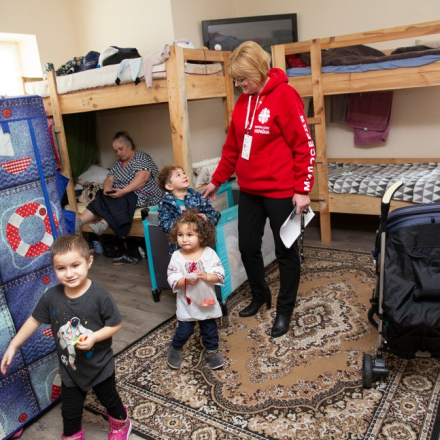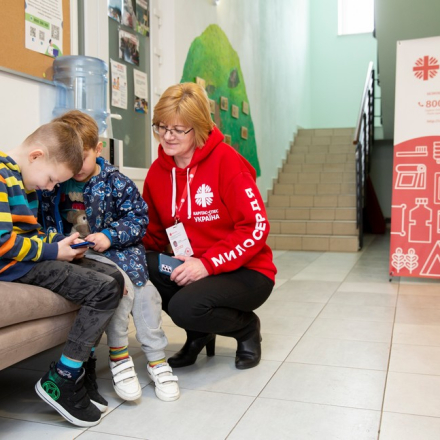“We would wash bed linen at our homes – and these were whole bags of it”: how the shelter in Lviv lived in the early days of the war and how it runs now.

As a shelter volunteer at the St. John Paul II Catholic Church in Lviv, Ms. Bronislava has heard dozens, maybe hundreds of stories. Stories of homes being gone, of leaving everything behind, of worry about those who stayed.
Ms. Bronislava came to the church three days after the war began, to help the first refugees arriving in Lviv. One year later, she is still volunteering, listening to stories and offering assistance. To Ms Bronislava, this is her “front” in the war.
"On the second day of the war, refugees started arriving to us," Ms. Bronislava said. "Volunteers called to Father and asked if we could shelter people."
Before the war, the shelter housed the Children’s Development Center, which held catechism classes for children, as well as provided space for specialists to work with children with autism. But the war forced a change in the center’s activities. Ms. Bronislava remembers well those first war refugees. There were eight of them and she immediately came to arrange the rooms for the night.
"We looked for mattresses and bedding to make their beds,” Ms. Bronislava said. “There weren't enough of them. I worked until the evening, and the next morning I woke up and told my husband, ‘I can't sit at home and read the news. I have to be there, at the parish.’"
Ms. Bronislava and her husband live 14 kilometers from Lviv, so in the morning her husband would drop her off at the shelter on his way to work and pick her up in the evening.
“I would stay late into the night,” Ms. Bronislava said. “Sometimes I even had to stay after the curfew."
Soon after refugees began arriving, they organized the kitchen and started cooking. "We would bring food from home, and I brought what I could because I understood that there would be many people here very soon,” Ms. Bronislava said. “At first, there was not enough of anything: no bed linen, no groceries. Washing the bed linen became a problem. The shelter volunteers would take the laundry home –these were full bags! We wanted people to sleep in clean beds. At the same time, much humanitarian aid would arrive. It had to be sorted and distributed to those in need.”
Meanwhile, the refugees kept arriving. Mrs. Bronislava recalls that they would look for transport to the border so that they could go to Europe. There were so many people that the volunteers worked long hours.
"We come in the morning, and people are just sitting in the church on the benches,” Ms Bronislava said. “Some leave, others arrive, and everyone has to be accommodated, fed, and provided with essential things. The number of people coming and leaving was incredible. Then it got a little easier because people started staying longer. And today, our regular residents help us. They clean the area, clean the snow.”
Today the shelter accommodates 85 people, 34 of them children. Most people have been staying for extended periods because they cannot return home. The war took away their homes, hometowns, familiar surroundings, jobs, and peace. Some have lost something far more precious – family members.
As time goes by, Ms. Bronislava says more people are wondering-- what's next? What if the war, which currently has no end in sight, will go on for years? What shall they do? How do you start over again? To support people to manage the uncertainty, a psychotherapist is available.
Mrs. Bronislava and her colleagues underwent psychological assistance training to develop the necessary skills to work with people in difficult life circumstances. Giving a bed and a bowl of soup is one thing, but sometimes it is much more important to support with a kind word.
"It's tough when a person's life is shattered instantly,” Ms. Bronislava said. “Yes, we also have air raid alerts and sometimes explosions. But we have a home we can always return to. And they only have a room in a shelter that they share with other people. They have nowhere to return to today, tomorrow, or in a month. It is, of course, really hard.”
In September, Ms. Bronislava received the St. John Strepa medal from Archbishop Mechyslav Mokshytsky for her conscientious and dedicated volunteer work. Ms. Bronislava appreciates the recognition of her work, as well as the words of gratitude from people who, as they say goodbye, thank her for accommodation and care.



